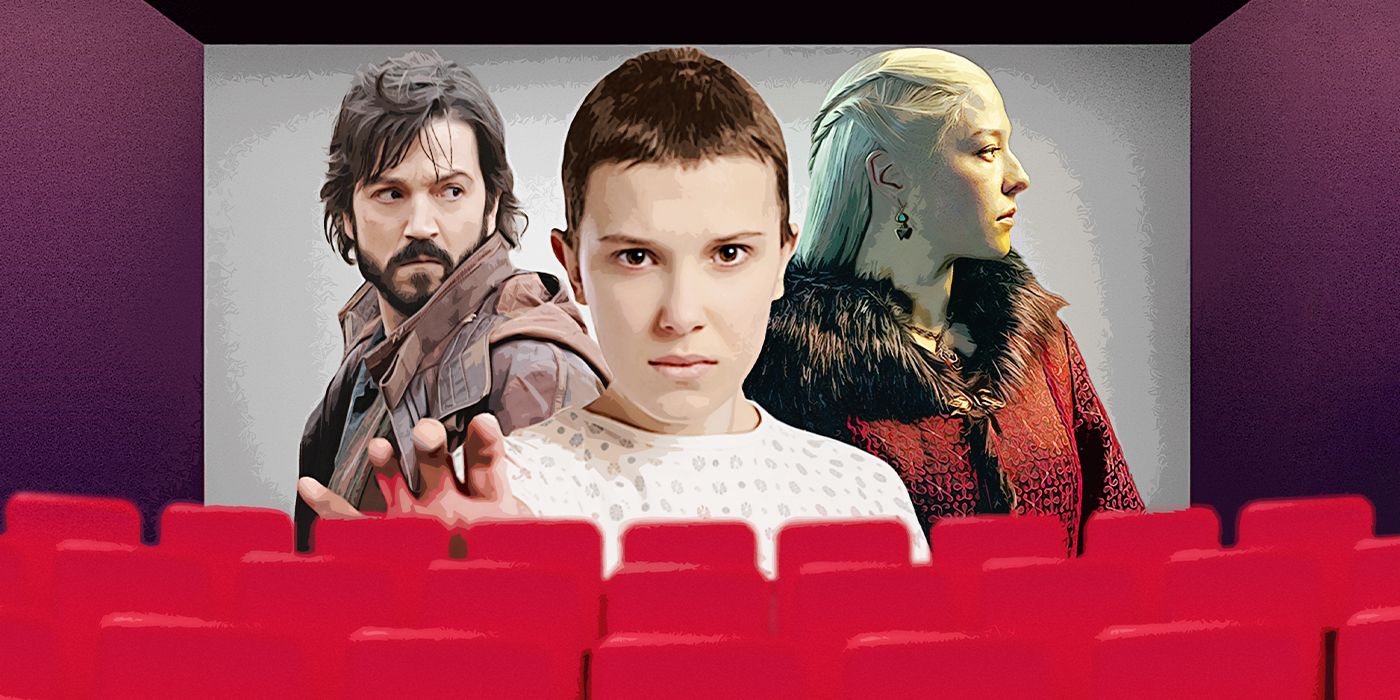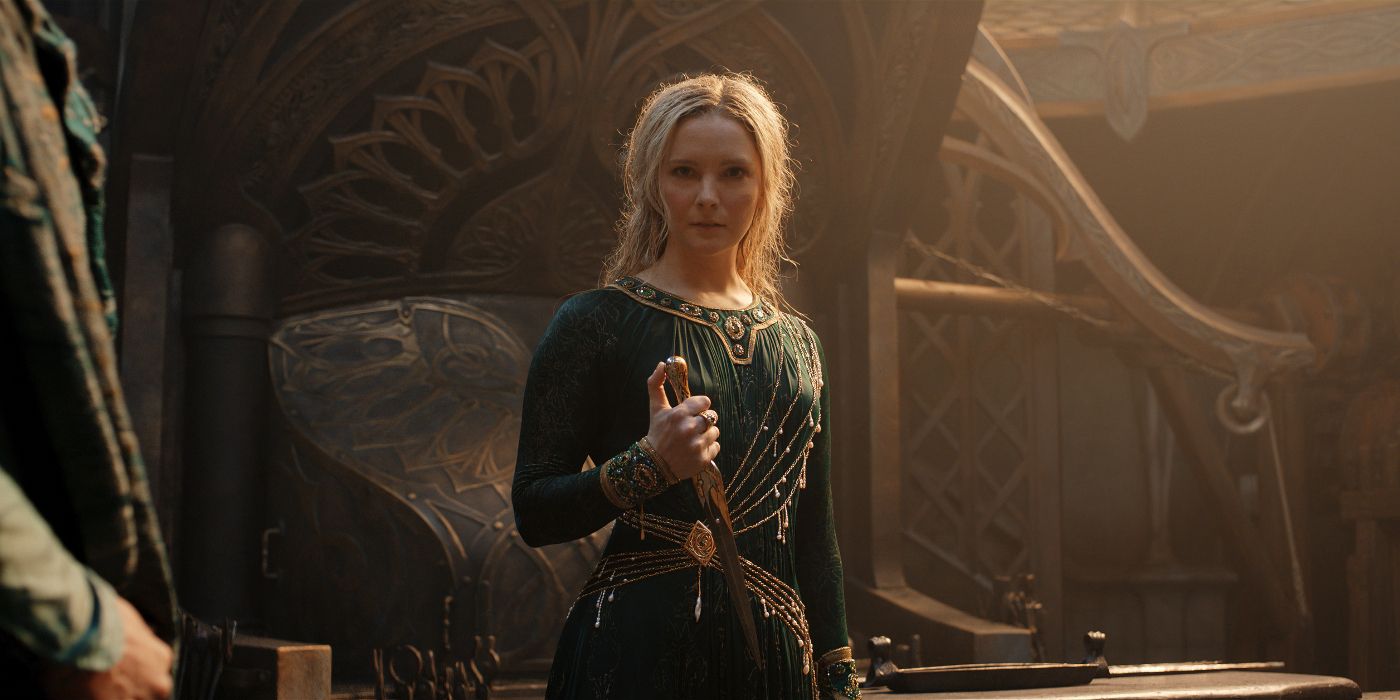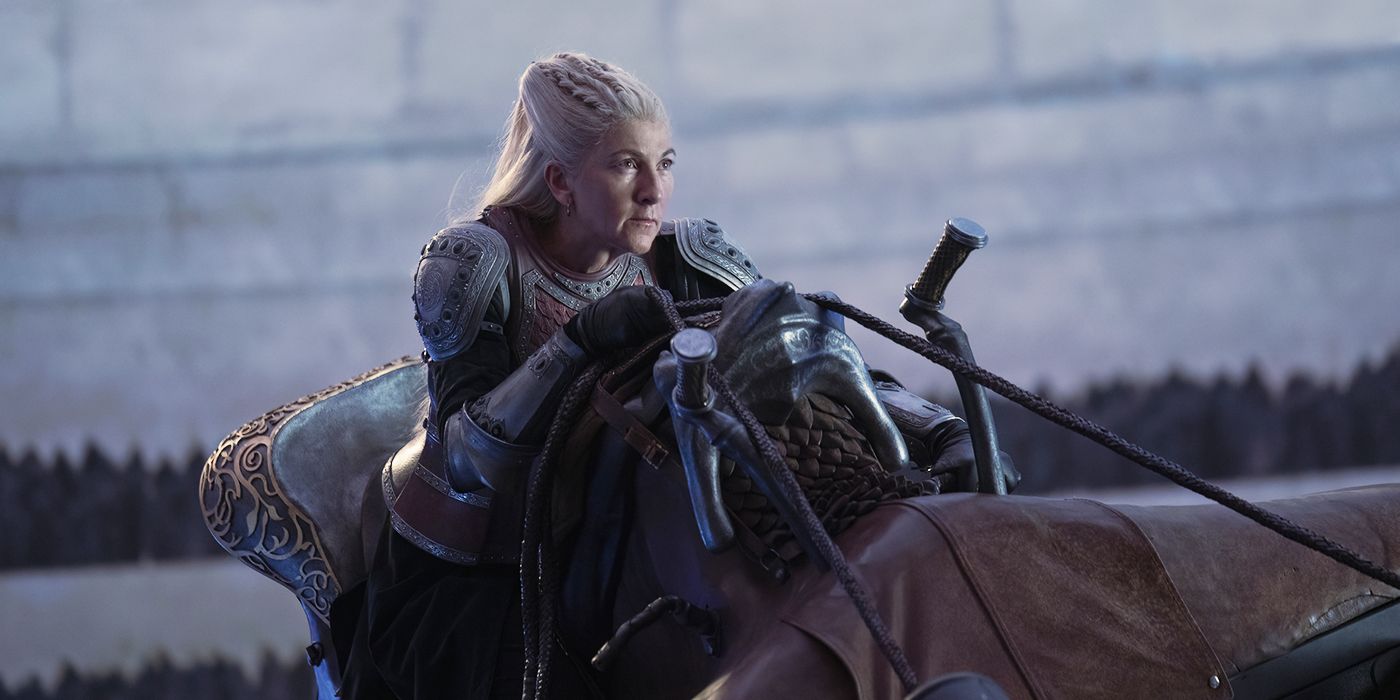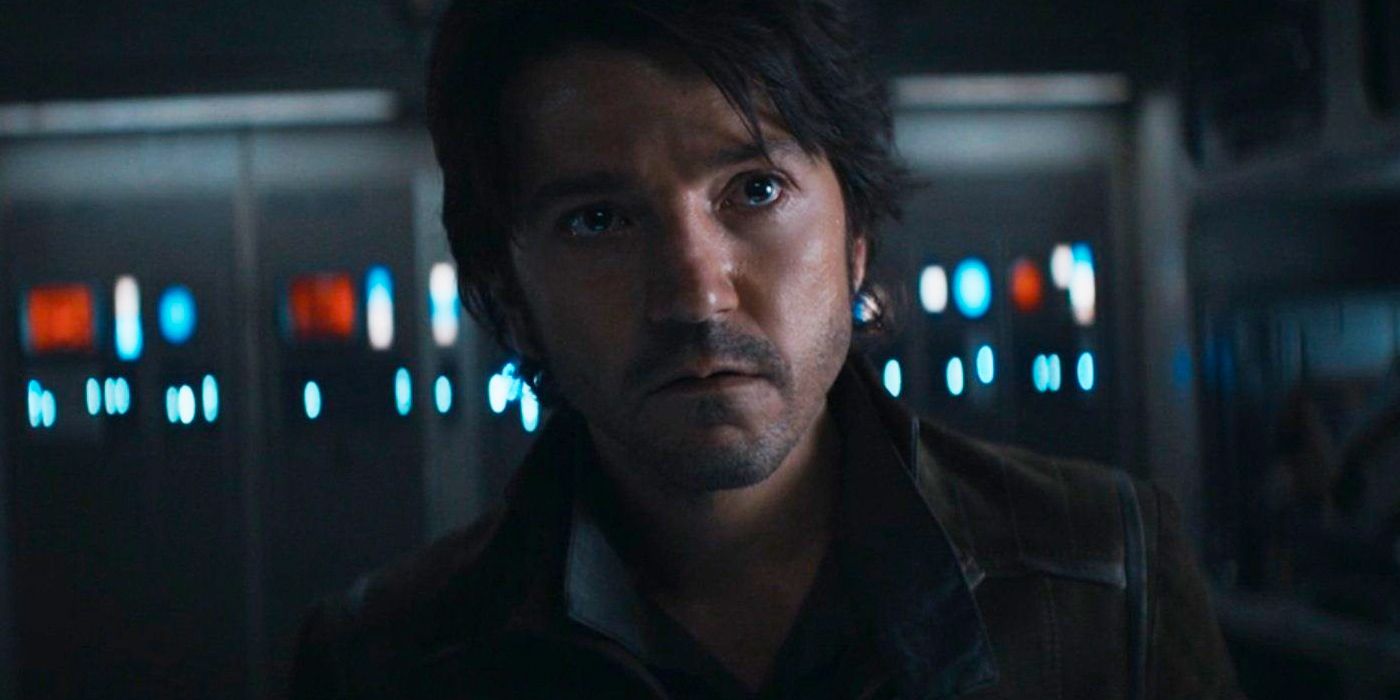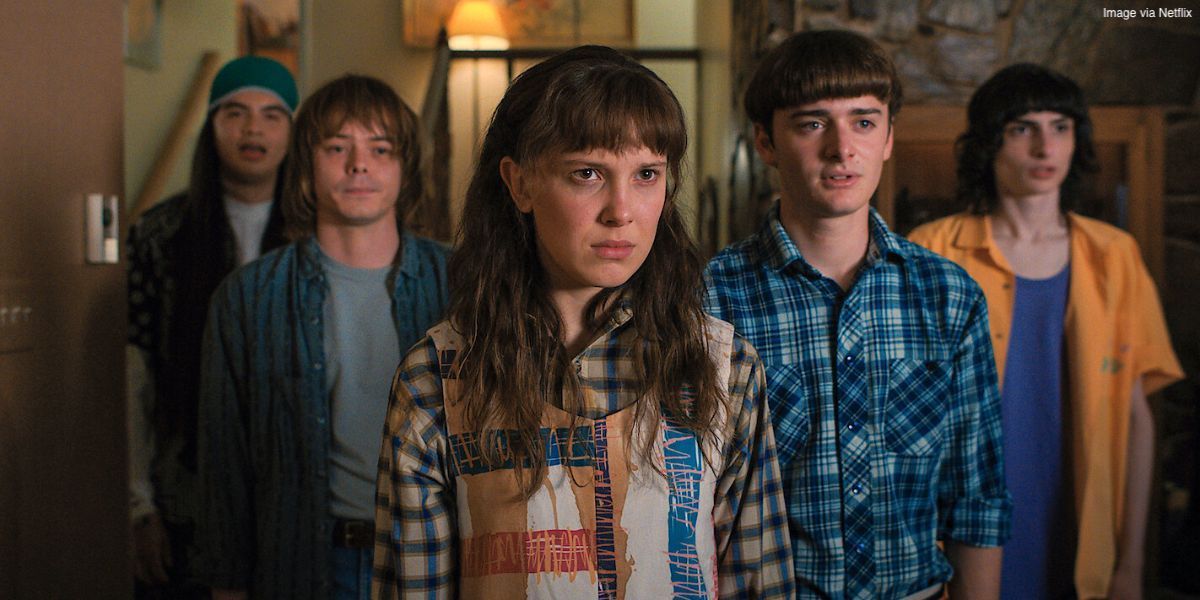Gone are the days when TV shows were considered to be a more private affair best enjoyed in the comfort of living rooms. The last decade or so has been remarkable for the television industry, both in terms of scale and possibilities. While good shows always existed, TV shows have now reached the stage where they are capable of extracting a truly cinematic experience — one that deserves to be indulged in on the big screen. As recently as The Lord of the Rings: Rings of Power, which cost Amazon nearly $500 million to make, it's evident that TV shows are not limited by economic restrictions or practical complications. In fact, such a budget even dwarfs those of big-budget Hollywood movie productions.
It's even arguable that some television shows such as Stranger Things and House of the Dragon have created more buzz than some of the most anticipated movie releases of the year. Not to mention how even Stars Wars, which started out as a theatrical marvel, has embraced and enjoyed the perks of the TV format through recent hits such as The Mandalorian and Andor while also tapping into a new fan base through television. There are multiple indications to suggest that it's the right time for theaters to adopt more television shows and bank on the growing popularity of some of the biggest names in popular culture.
TV Shows Are Bigger Than Ever
The growth in budgets of TV shows is a monumental testimony to the power the smaller screen offerings have yielded in the past years. And interestingly, the blooming budgets are not devoted to attracting big stars. Instead, the big-budget backing from major production studios has helped TV show makers weave awe-inspiring fictional worlds even within the small constraints of the television screen. From the 2010 HBO miniseries The Pacific to the most recent Prime Video's Rings of Power enjoying mammoth budgets, the economic strength is proof of how the television and streaming industry has placed its bets by duly considering the economic potential of the format. Importantly, this has allowed makers to think beyond practical restrictions and become visionary storytellers who can conjure any magic they want on the screen.
The story that George R. R. Martin wrote Game of Thrones books in such an elaborate way to make it impossible to film is now part of eternal television lore. To note how Game of Thrones ruled much of the last decade helps deduce that TV shows have become the best way to deliver complicated stories without making a compromise on the vision behind them. As much as the success of Game of Thrones can be credited to the creative team and actors involved it¸ it would not have been possible if not for the gamble that HBO was willing to make. Consequentially, Westeros was built in the most imaginative way possible, allowing the world created by Martin to arrest the imagination of audiences for decades to come just the way George Lucas' Star Wars did back in the '70s.
TV Shows Demand A Bigger Screen Experience
As a result of the economic strength some big names have enjoyed, it has become possible for show makers to deliver shows that benefit from the improvements in technology. No longer does a show need to have big names to attract audiences from the first episode; great storytelling and filmmaking could be banked upon. Undoubtedly, where good economics and technology meet, magic is allowed to happen. As a format, television always enjoyed the credibility of being a great format for storytelling, allowing ample time for character arcs and story arcs to develop. But it has now reached the point in its evolution where TV shows bring the great cinematic experience that films are known to bring to the big screen.
With big budgets allowing makers to enjoy longer production phases, TV shows achieve detail and grandeur that, honestly, very few films do anymore. There hasn't been any other time in history, when it comes to cinematic brilliance and scale, that television has given films such a run for its money. With wizards and dragons making a comeback to television just the first year after the pandemic scare has receded, it's evident that another decade will see audiences witnessing breathtaking landscapes and captivating worlds, which undoubtedly deserve the bigger-screen experience.
It feels unfair to allow such creative brilliance to thrive without letting the audiences enjoy it to the fullest. For films, theaters have allowed audiences to access the grand experience the films are made for regardless of where each member of the audience has come from. It's only fair that TV shows start getting the same treatment to allow the audience at least the option to enjoy what’s being presented in all its glory. Moreover, as a matter of principle, if the showrunners of TV shows are no longer restrained by the limitations of what's possible on the small screen, the experience extended by the final product should not be limited by the size of the screen it is being presented on either.
Films Have Been Struggling in Theaters
The rise that Marvel has enjoyed in the past decade has only further weakened independent films and standalone stories as the franchise model has taken the entertainment industry by storm, in the case of movies as well as TV shows. The interest in stories that are limited in scope and possibilities have diminished. Big studios have been trying to cash on the success of the franchise model with every successful standalone film also being seen as a convertible opportunity for the birth of a dependable franchise, around which the endeavors to produce independent films can survive.
From merchandising to spin-offs, franchises offer more lucrative business opportunities. For obvious reasons, the favorability that the franchise model enjoys is because of the audience's growing love for nuanced storytelling, which is best achievable in the longer form. This change in the consumption pattern leans more in favor of TV shows than films as the former extends the opportunity for greater world-building and characterization than what limited runtimes of films do.
Audiences are no more satiated by knowing what happens with their favorite characters during the events of one film; they want to know the backstory as much as what lies ahead. While films will continue to enjoy popularity with movie-goers, there's a clear shift in the watching behavior of audiences who are more interested in committing to stories that span across multiple offerings — something achieved only by franchise films or TV shows. And bear in mind that not every franchise enjoys the same success as that enjoyed by Marvel; Warner Bros' struggle with DC is already popular. In a situation where audiences are themselves leaning towards a form of storytelling offered more by television shows, films are bound to struggle even if the possibility of a resurgence always remains possible.
A Symbiotic Relationship Can Exist Between TV Shows and Theaters
Like the rest of the world, COVID-19 brought the movie business to a standstill. During the pandemic, television and streaming services became the go-to outlets for entertainment. With the pandemic receding, theaters continued to suffer apart from the few instances when audiences came to the theater, thanks to event films, which are mostly Marvel productions. The film industry in itself has been finding it difficult to enjoy the big weekend collections it once easily garnered. If not for the few saving graces, the post-pandemic era has been one of the toughest for the theater business. Guillermo del Toro even admitted in an interview with Variety that some of his films would not have made it if not for the backing received from streaming services.
To add to the pain, TV shows have enjoyed a heyday during the same time. With 20 million people tuning in on HBO or HBO Max to watch the House of the Dragon, the television industry has thrived and how as compared to the struggle of the movie business. Not to forget that the space maintained by giants such as Disney and Netflix allow smaller movies to skip the theatrical release. This leaves theaters to really depend on the Black Panthers and Spider-Mans of the world to save them amidst the dipping business. All this makes for a valid argument as to why theaters should consider the wider adoption of TV shows as a dependable form of business that will attract casual audiences and hardcore fandoms to come for a much-awaited season premiere and finale of a TV show.
As already established, streaming services and on-demand television have become popular destinations for smaller film releases that may not attract a feasible audience if released in theaters. In such a situation, it's only a matter of time before theaters also start looking towards TV shows as a more feasible opportunity to cash in on the huge audiences that some of the TV shows attract. At the same time, businesses such as Netflix that are struggling to make money by depending only on the subscription-based model can also find a lucrative opportunity by collaborating with theaters to bring some of the biggest offerings from their carousel to the big screen. With many films directly finding a home on smaller screens, it would bring a fair balance if more TV shows would also find more space in theaters. Doing so would help the films and TV shows benefit from the perks extended by each other's presence; the advent of streaming services has anyway diluted the strong demarcations that once existed between the two.
Certainly, if there was to be a juncture in history when it should have been a logical step for theaters to look toward TV shows, it has finally arrived. With certain TV show releases becoming bigger events than the release of a good 90% of films out there, there are limited reasons that work against the adoption of TV shows by theaters. Understandably, it is not something that has not been tried before. AMC recently featured the premieres of Tulsa King and Yellowstone in theaters two weeks before the television release. But the evolutionary curve of TV shows has reached the stage where it becomes quite obvious why there should be more theaters showcasing more TV shows. With shows such as Andor and Rings of Power bringing a larger-than-life cinematic experience to television screens, it is time when the same is replicated and enjoyed on the best possible screen — that of a theater — as a norm and not as an exception!

